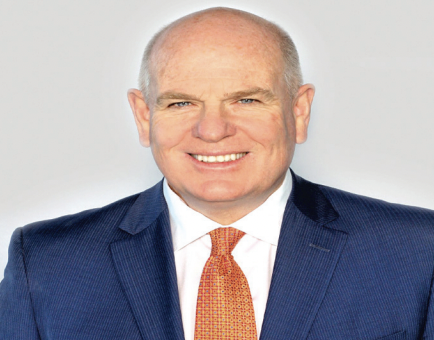It’s not all Grimm! A conversation with Board of Trustees member: Fred Grimm on University’s past, future

By Albert Chang-Yoo
On February 24, the University of Puget Sound’s Board of Trustees will meet to discuss “A Sound Future.” Currently, the University needs to crawl out of a $10 million deficit during a time in which enrollment has reached painful lows. However, in the midst of financial turmoil and potential program discontinuation, Frederick W. Grimm, ‘78, is not worried about the University’s ability to succeed.
For 18 years, Fred Grimm has faithfully served as a member of the Board of Trustees, the fiduciary body that oversees the University. Grimm is the CEO of Triad Development, a Seattle-based real estate company, which he founded in 1984. Before graduating in 1978, Grimm played for the football team, was a member of Phi Delta Theta, and became ASUPS president. Trustees serve for three-year terms and Grimm is one of the longest-sitting members. In over 50 years, he’s seen the University experience both turmoil and revival.
“The one thing that students should know, I heard from one of the sessions that the trustees should take a cut in their compensation. Well, that’s a good idea, because we don’t get any compensation,” Grimm said smilingly. “First and foremost, we do it because somebody else did it for us to make the University of Puget Sound what it is today.”
As it stands, 14 faculty members took an incentivized early retirement package and the University recently hired a data analytics firm, Gray Associates, to piece together a program review. The Board of Trustees will vote on a finalized slate of recommendations in May. “It’s a work in progress. It’s a collaborative piece of a lot of ideas being created, and analysis, and give and take on how we should proceed,” Grimm said of “A Sound Future.” “But, “A Sound Future” plan is a necessary response to conditions in the world and conditions at the University of Puget Sound.”
As ASUPS president, Grimm was the student representative at many Board of Trustee meetings during the ‘70s: “And I can remember issues being brought up then in trying to elevate the quality of the education,” he recalled. During the 1960s, the University established itself as a known party school, and spent much of the next decade rehabilitating its image. According to Grimm, “it created a lot of angst on campus, because it was going to involve changing dynamics of some of the programs, and also, faculty members.”
Grimm also spoke of another turbulent time in the University’s history: the move from Division II to Division III. “I was one of those who benefited from athletic scholarships, as did a lot of my teammates. That was a big deal, because when you play a sport, you want to play as high a level as you can,” he said.
“But I think, turns out it was probably a pretty good one for the university and having the balance that it currently has with a strong athletic program that’s better in balance with the academic charge of the university.”
Today, the University faces another inflection point in its history, with big changes coming. “This doesn’t happen every three-year term for sure. And it’s a big challenge,” Grimm remarked. But through his experience, he is assured of the University’s resilience: “I think that the biggest thing that equips us to handle this is the degree in which everyone cares so much about this university. The passion of the students, the unbelievable commitment of the faculty, the hands-on involvement of the staff, the administration and the trustees, I think that that’s not present at every university.”
Grimm acknowledges the lack of on-campus presence by the Board: “The Board of Trustees are not in the classroom, they’re not on the soccer field, with the coaches, or in the classroom with the faculty; and we come in three times a year.” However, he believes the Board still does necessary work: “We have a ton of homework, to review, in terms of documentation, of what’s going on and trends and trying to keep abreast of what other universities are doing and what’s happening out in the marketplace. And that’s something that students wouldn’t see or appreciate.”
“But the University of Puget Sound has done a pretty good job of trying to connect trustees to faculty and trying to connect trustees to students,” Grimm said. Trustees host meetings with both faculty and students each time the Board meets. “I use that as a chance to kind of say, you know, what? How are you doing? We hear about X issue. How does that impact you? Or does it impact you? Is that something you’re concerned about? I think a lot of the trustees are interested in trying to have that kind of interaction,” he said. The next Board of Trustees Meeting will be held on Friday, February 24 at 2:00 PM inside the Tahoma Room, and will be open to the campus community
